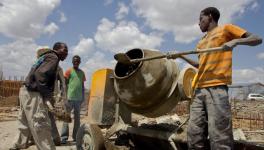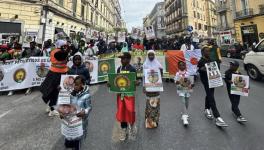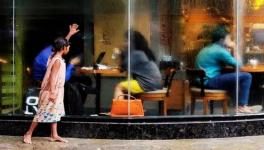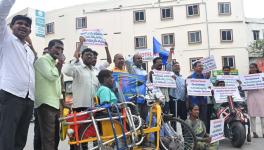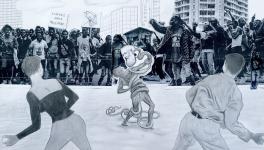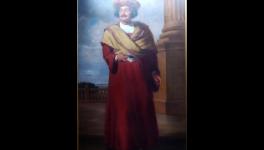'Institutional Racism': Experts From Cameroon Denied Visas
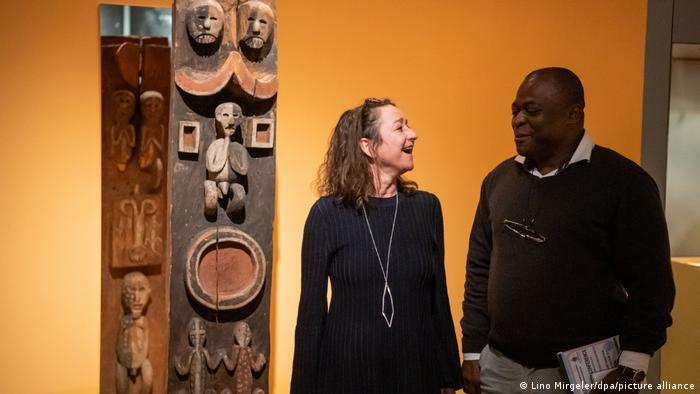
Karin Guggeis, research director at the Museum Fünf Kontinente, and her Cameroonian colleague Albert Gouaffo
For the past two years, Yrine Matchinda and her colleague Lucie Mbogni Nankeng of the University of Dschang have been touring Cameroon's francophone areas.
"We're doing field research in the different communities," says Matchinda, explaining her role in the elaborate German-African project, which is researching the collection of Max von Stetten, a former commander of the Imperial German troops in colonial times.
Von Stetten was stationed, among other places, in Cameroon, which was a German colony from 1884 to 1916.
The collaborative project was initiated by the German Lost Art Foundation and the ethnological Museum Fünf Kontinente in Munich. Von Stetten donated his collection to the latter in the 1890s.
Among the more than 200 objects from his collection are masks, statues, arrows, spoons and cult objects — including the so-called "Blaue-Reiter-Pfosten" (Blue Rider Post), which the expressionists Franz Marc and Wassily Kandinsky depicted in their 1912 art almanac, catapulting it to fame.
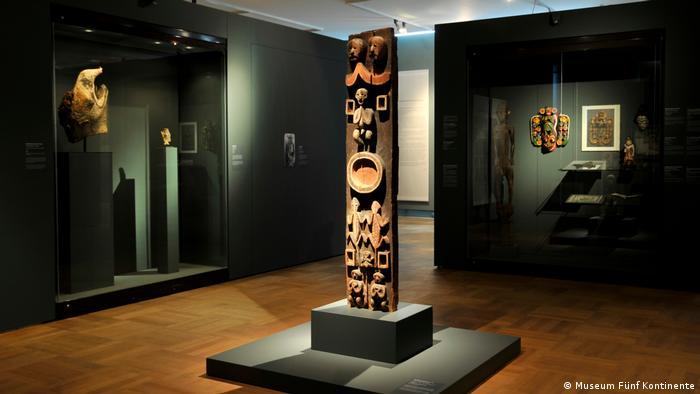
'Blue Rider Post' (middle) in Munich's Museum Fünf Kontinente
But from which context does the post originate? Is it possibly a sacred object? And what about the other objects in the collection?
Context is key
"Recently, for example, we found out that the 'Byeri,' one of the statues from the Munich collection, is a sacred statue from the Mabi tribe," explains Matchinda.
The research assistant wanted to present these and other findings at a final workshop in Munich. But both she and her English-speaking colleagues Joseph Ebune and Ngome Elvis Nkome, both from the University of Buea, were denied entry to Germany.
According to the German embassy in Yaoundé, the birth certificates were missing from the documents of the two professors. But Matchinda's rejection letter states: "There are reasonable doubts about your intention to leave the territory of the [EU] member states before the visa expires."
"I consider this claim against me to be a racist act," Matchinda told DW. "I cannot understand how I can be denied my visa for such an important project on such grounds."
Especially since she had already traveled to Germany once at the start of the project two years ago. Albert Gouaffo, her professor and project leader on the Cameroonian side, speaks of "institutional racism": "There is a colonial perception that persists. And especially at this crucial time when we want to redefine our relations."
A backward step in diplomatic relations
In this regard, Gouaffo is addressing current efforts in Europe to confront its colonial past, for example, by restituting artifacts looted during the colonial period, such as the famous Benin bronzes, to sub-Saharan Africa.
In fact, the German-Cameroonian project is in some ways a role model.
"Traditional" provenance research in Germany often tries to clarify the acquisition and ownership relationships — that is, to establish a legitimization of the collections. But in this project, emphasis is rather placed on the production context and the tracing of the journeys of the objects from the former colonies to Europe, and in this case, to Germany.
"They are not just objects, they are cultural symbols that convey history and wisdom. Some are considered animate [in their societies of origin]," says Germanist Gouaffo, explaining the research approach. "You can only identify these objects by working with the communities that created them. They have the intrinsic knowledge of their functions, because there were some [objects] that were only made by initiates."
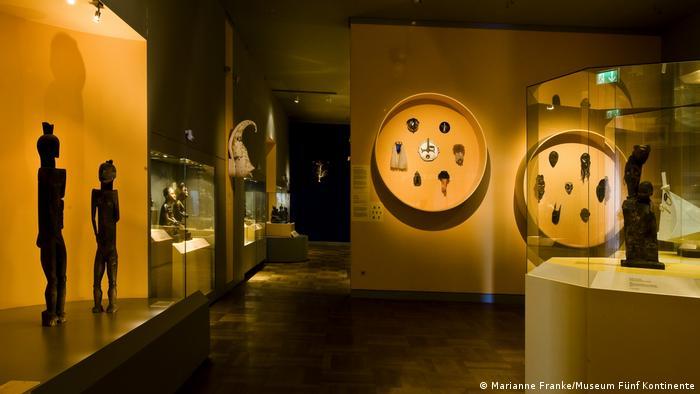
Many items in the African section of the Museum Fünf Kontinente were acquired in colonial times
Priority or not? Reappraisal of German colonial history
Especially with regard to this research approach, which is based on the results of the scientists on site, the refusal of their entry on the part of the German embassy is difficult to understand for the project team.
DW has received a written statement from the German Foreign Office, stating that the German government has explicitly stipulated in its coalition agreement that the reappraisal of German colonial history should be promoted, among other things, by supporting international collaborations such as the German-Cameroonian cooperation.
In addition, the statement said: "(...) our embassy in Yaoundé [has] expressed its support for the project, among other things, by maintaining a constant exchange with the museum, advising on visa applications and granting applicants a special appointment, whereby other applicants were put on hold. Unfortunately, the applicants did not provide the documents required by the legal situation, and as a result the visas could not be issued."
If it had only been about the birth certificates of the two professors from Buea, they could have been submitted later, project manager Gouaffo told DW. Matchinda's application had been complete anyway, he said. "In her case, a document proving her admission for her second year of doctorate studies, issued by the university, was contested."
Top historians react
The rejection of the visas caused an uproar in German academic circles last week.
Benedicte Savoy, one of the leading historians on looted art, published a petition in which she and other colleagues of Berlin's Technical University demanded a visa policy that would permit transnational cooperation.
Meanwhile, in Munich, the decision was made to postpone the planned project workshop and hold it digitally on January 21: "It took me some time to recover from the visa rejection," admits Matchinda. "But then I understood that we have to continue and I have to fight to achieve my goals."
Getting a visa for Germany or Europe in general is not only a challenge for African researchers. Just last year, the EU changed the rules for short-term visas, so-called "Schengen" visas.
Now, among other things, whether or not the respective countries from which the applicants originate do indeed cooperate with the EU in taking back deported migrants also plays a central role.
This is yet another hurdle in a complicated and, at first glance, not always transparent procedure.
This article was originally written in German.
Get the latest reports & analysis with people's perspective on Protests, movements & deep analytical videos, discussions of the current affairs in your Telegram app. Subscribe to NewsClick's Telegram channel & get Real-Time updates on stories, as they get published on our website.









